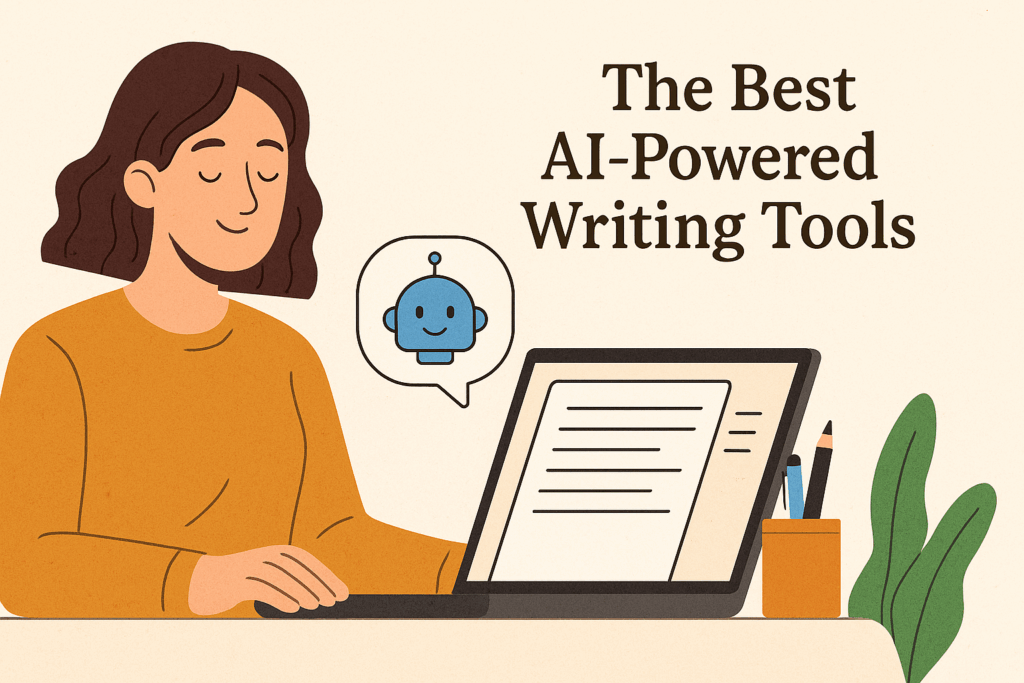Let’s face it—writing isn’t always easy. Some days, words flow like coffee on a Monday morning. Other days? It’s a full-on creative drought, and you’re staring at a blinking cursor like it personally offended you. Enter AI-powered writing tools. These are not your boring spellcheckers or robotic sentence rephrasers from 2005. We’re talking intelligent, adaptable, freakishly good writing assistants that can turn your messy ideas into polished gold. Whether you’re running a business, writing blogs, or just want to sound smarter in your emails, these tools are here to help.
And no, they’re not replacing writers—they’re making us better.
Here’s a human-friendly breakdown of the best AI-powered writing tools in 2025, how they use content automation to save your sanity, and why they’re the new secret weapon for everything from AI copywriting to novel plotting.
1. ChatGPT – The Swiss Army Knife of Writing Assistants
Let’s get the obvious one out of the way. ChatGPT is the reason half the internet sounds smarter now. Whether you’re drafting a newsletter, brainstorming blog ideas, or need a quick witty caption, this tool gets you. It’s not just autocomplete on steroids—it’s a collaborative partner that uses natural language processing to co-write, rephrase, summarize, and even joke with you.
Why it rocks:
- Great at adjusting tone (want snarky? Professional? Pirate-themed? Done.)
- Insanely fast at first drafts
- Surprisingly good at making your messy thoughts coherent
If you’re stuck in your head, ChatGPT gets you unstuck. It’s that friend who always knows what to say.
2. Jasper – The OG of AI Copywriting
Before AI writing was cool, Jasper was out here writing killer product descriptions, ad copy, and email sequences. It’s tailored for marketers and content creators who want content automation without sounding robotic.
Best for:
- High-converting copy
- Marketing teams
- Content at scale without sacrificing quality
It comes with dozens of templates—think: “Blog Post Intro,” “AIDA Framework,” “Product Description.” Basically, it makes you feel like a copywriting wizard, minus the burnout.
3. Grammarly – The Grammar Nerd You Actually Like
Sure, Grammarly isn’t the flashiest, but it’s a classic for a reason. Think of it as your personal editor—one that’s way less passive-aggressive than your college professor. While it’s known for grammar fixes, its tone suggestions, clarity improvements, and AI-powered rewrites make it a legit writing assistant in 2025.
Why it still matters:
- Suggests better phrasing without butchering your voice
- Helps you sound clear, confident, and human
- Catches mistakes you didn’t even know were mistakes
Bonus: Its new generative AI features can now help you write, not just correct what you wrote. Big glow-up.
4. Notion AI – For the Organized Chaos Creators
If your brain works in half-thoughts, bullet points, and “I’ll finish this later,” Notion AI is your soulmate. It’s built right into the Notion workspace, so you can brainstorm, outline, and draft without switching tabs. Perfect for writers who also need to plan stuff.
What it does best:
- Converts messy notes into clean summaries
- Helps organize writing projects
- Drafts content within your workflow
Whether you’re planning a book, launching a course, or managing a blog calendar, this is content automation in its most natural form.
5. Copy.ai – Your Copy BFF
Need Instagram captions? Product headlines? Taglines that pop? Copy.ai lives and breathes bite-sized content. It’s built to turn small prompts into big impact, especially if you’re juggling content creation across platforms.
Highlights:
- Super fast idea generation
- Best for short-form content
- Great for entrepreneurs and freelancers
If Jasper is the full-service agency, Copy.ai is your go-to for quick wins.
Why These Tools Actually Work (and Aren’t Just Hype)
AI writing tools today don’t just regurgitate facts—they learn. They adapt to your tone, pick up on context, and generate content that doesn’t sound like it was written by a toaster. The best of them tick all the boxes for Google’s EEAT standards (Experience, Expertise, Authoritativeness, and Trustworthiness).
Here’s how:
- Experience: These tools are trained on billions of writing samples—more experience than any human could ever get.
- Expertise: Tools like Jasper and ChatGPT pull from curated datasets, giving you informed content that’s not just fluff.
- Authoritativeness: Many integrate SEO insights, so your writing doesn’t just sound good—it ranks.
- Trustworthiness: You still control the final output. AI helps. You decide.
Final Thoughts: The Robots Aren’t Coming for Your Job
Here’s the deal: AI-powered writing tools aren’t here to replace writers. They’re here to kill the boring parts of writing—staring at a blank page, rewriting the same sentence six times, or figuring out how to sound professional in an email when you’re half-asleep.
Use them right, and they’ll make you faster, sharper, and a lot less stressed. Which, let’s be honest, we could all use.
So go ahead—get yourself a writing assistant. The future’s already typing.


